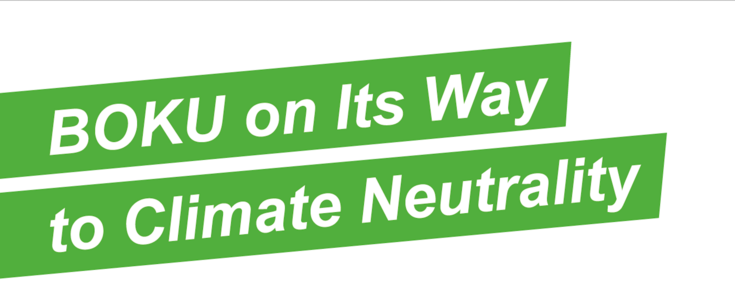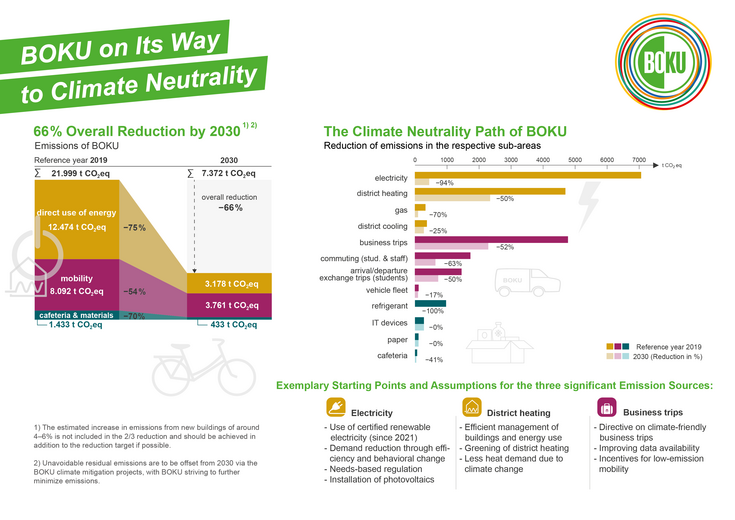22.06.2022 - BOKU on its way to climate neutrality

In line with the motto "avoidance and reduction comes before compensation", BOKU wants to reduce its greenhouse gas emissions and also compensate for unavoidable residual emissions via climate protection projects from 2030 at the latest. The share of residual emissions should continue to decrease after 2030.
The University of Natural Resources and Life Sciences Vienna, as the leading sustainability university in Austria, is on its way to climate neutrality. "BOKU has set itself the goal of reducing two-thirds of its greenhouse gas emissions by 2030 - a very ambitious but feasible goal," explains Rector Eva Schulev-Steindl.
The climate neutrality path of BOKU
Based on BOKU's greenhouse gas balance of 2019, a climate neutrality pathway was developed. "This path shows reduction potentials of the individual emission items and thus represents the first stage of BOKU on the way to climate neutrality. We have taken into account assumptions about future developments inside and outside BOKU," says Alexandra Penicka from the Center for Global Change and Sustainability.The most emission-intensive items on the balance sheet are clearly electricity, district heating and business travel. Special attention is paid to these areas.
For example, BOKU has already taken a major step towards climate neutrality by switching to eco-label 46 (UZ 46) certified green electricity since January 2021. This guarantees that the electricity really comes from renewable energy, and about one third of the emissions could already be reduced with this measure compared to 2019.
The reduction of emissions caused by business travel, on the other hand, represents a greater challenge for universities on the path to climate neutrality. After all, international exchange and participation in scientific conferences are an integral part of everyday university life. Here, the focus should be on making business trips sustainable and exploiting the potential of videoconferencing and online meetings.
Last but not least, smaller items must also be reduced as far as possible in order to achieve the two-thirds target - because every ton counts. This requires a variety of measures, and a concrete set of measures is currently being developed by the working groups of the BOKU Environmental Management Network.
Already in the BOKU Sustainability Strategy 2019-24, BOKU's climate neutrality by 2030 was defined as a desired strategic goal. This intention was reconfirmed with the Rectorate's decision in principle in November last year and a concrete two-thirds reduction target was set (base year 2019). According to estimates, a roughly 4- to 6-percent increase in emissions is to be expected as a result of planned new buildings at BOKU. This increase is currently not included in the two-thirds reduction and should be saved in addition to the reduction target if possible. In addition, unavoidable residual emissions are to be offset from 2030 at the latest, and BOKU will continue to strive for further emission reductions thereafter.
Graphics on the climate neutrality path:
https://bokubox.boku.ac.at/#cf8dd2c968b4c3604a6c938f2deeb1d8
Further information:
https://short.boku.ac.at/kn-pfad
Climate protection at BOKU: Center for Global Change & Sustainability::BOKU
Inquiries & Contact:
DIin Sarah Siemers
Center for Global Change and Sustainability
Sarah.siemers@boku.ac.at
+43 1 47654-99125

